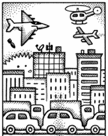
It certainly feels to me more peaceful and convivial in Germany and Holland, for example, than in the U.S. Aside from the oft-heard complaint of the U.S. as a crime-ridden and crazy place, here are three factors out of several offered in this article that contribute to significant cultural and physical-environment differences:
• The threat of physical violence posed by police and associated agencies that can instill fear without even making direct contact with civilians
• Job-insecurity and obsession about money for survival and self-image
• The car-oriented infrastructure that makes most streets potential death zones for pedestrians and bicyclists, not to mention creating ugly urban blight
[Not necessarily listed in order of importance.]
There appears to be more shocking police brutality in the U.S. than before, with more focus by alternative media outlets such as Alternet and Truthout. Conventional news reporters tend to downplay police crimes because the police are important sources for news stories. But regardless, violence by police, sociopaths killing random crowds, and rising suicides are but symptoms of a society looking more like a madhouse than anywhere else besides war zones.
Studies show violent crime diminishing in the U.S., even since colonial times. Gun ownership was high at the outset, to kill off the natives and control the slaves. But the drop in violent crime in the U.S. in the last 20 years is a perceived trend partly reflecting changes in reporting and statistical processing. It is also unknown how much behavior has changed short-term due to pharmaceutical drugging of the population at large. The U.S. population is also getting more obese, pacified and dumbed down by pollutants and ill health. As the population ages on average, less crime per capita is perpetrated or recorded on or by oldsters.
The picture the corporate news media attempt to put across about life in the U.S. is a happy one injected with superficiality. Unravelling of the social fabric is not dwelled upon, or when it is there is much scapegoating instead of any radical critique of society. Sensational crime, but hardly ever the stuff committed by higher-ups, is deemed newsworthy but seldom examined as part of societal malfunction and cultural values. The price the public increasingly pays for a little more safety detracts from quality of life. We are less safe than ever, what with aging nuclear power plants, to name just one anxiety factor that almost everyone tries to ignore.
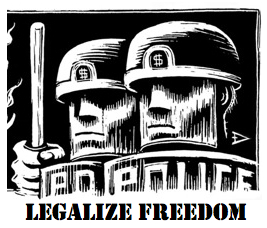
The highest rate of incarceration in the world may take many violent people off the streets in the U.S., but crime against the homeless is on the rise, and the people who go to jail are not the rich who initiate the inequities and scams that impoverish many innocent people -- some of whom may be pushed into committing crimes. There has been more criminalization, as laws multiply -- as they must in high densities of population. Protesting peacefully is unconstitutionally prohibited, such as when the U.S. government deemed Occupy protests as "low-level terrorism." Tens of thousands of people are in prison for having possessed modest amounts of plant material for smoking, while more alarming to some is that raw milk and growing food at home are occasionally targeted by corporate interests dictating law.
Efforts to counter pervasive violence or reform the system seem to go nowhere. Or, perhaps, there is a silver lining of resistance that is making a difference -- how much worse off would USAnians be without the coverage and vigilance on police brutality? Yet, there seems to be no controlling deeply rooted behavior such as hate-killings and suicides. Similarly, state-sponsored violence such as wars of choice seems to have no cap except suicides of soldiers (greater in number than combat deaths).
One reason the pervading vibe of violence or tension in the U.S. is high and not decreasing is the promotion of fear. One terrorist or one lone nut gets headlines and justifies the militarization of police departments. (They're even getting drones.) Meanwhile, the far greater threats of automobile crashes, heart attacks from the sedentary lifestyle, medical malpractice, cigaret addiction, etc., -- perpetrated or encouraged for profit -- are tolerated as exercising "freedom." Overall, peace of mind and a relaxed population are out of the question, especially given the end of boom times after cheap abundant oil peaked several years ago.
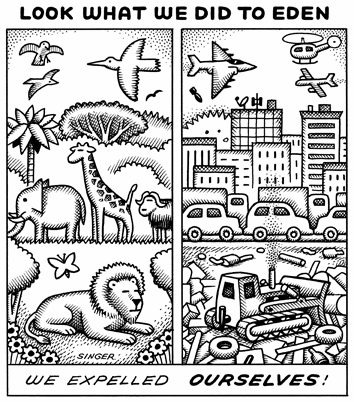
The recession means less personal release in shopping. Worrying about paying the rent or the mortgage adds to mass tension. Combined with the gun culture, oppressive policing and the "us against them" militaristic foreign policy, a vibe of some kind of violent tension is more palpable in the U.S. than in every other nation I have spent time in (dozens).
The U.S. ego is something to behold -- a bit of a joke globally. Many Americans believe their country is number one in general, but that notion doesn't stand up at all in terms of infant mortality, life expectancy or literacy. Income maldistribution is worse than any other industrialized nation. Those who have jobs are usually overworking, compared to many other nations.
But even among non-flag wavers, the childishness and insecurity of the U.S.Anian ego can be found every day. A new nation, relatively speaking, with a culture not quite climbing out of racist genocide, with a pioneer attitude about exploiting nature without limit, runs amok with mass participation or reverberations. An uptight defensiveness of many people in the U.S., especially on the West Coast -- the end of the trail for those fleeing the old world and the more stodgy East Coast -- can be expected on any day. It is far worse in the San Francisco Bay area than in friendly Portland, Oregon, to highlight the extremes. Perhaps due to the liberal sprinkling of nuts, a U.S. resident that one may encounter is more likely going to be on edge, rude or act insecure, compared to other nationalities. Enough uptight people in a population can be like the one bad apple spoiling a barrel, or, tainting it with a vibe. This is not to say there are not millions of very nice people in the U.S., and there is much to be proud of, such as the country's wilderness areas and huge, beautiful parks.

This column has always attempted to examine the big picture and look to deep issues such as our relationship with nature. Tracing the global, dominant culture of market economics, consumerism and state violence to the beginning of Western Civilization, we see inevitable developments that are mostly unquestioned. Vaunted progress excuses the foibles of exploitative, oppressive forces such as governments and corporations. But in these times of accelerating social change and destruction of nature we always need fresh analysis and observation. How the U.S. is perceived never goes out of style, but piercing the images and concepts with sharper critique has been necessary as the U.S. leads the world in war and per-capita energy waste that heats the planet.
It is myopic to concentrate totally on the latest outrage or controversy -- NSA snooping on all citizens' private communications; wars; creeping GMOs in food; the ongoing Fukushima catastrophe, to name a few, as terrible as they are. It is all well and good to stand up to these extreme dangers, but the root problem is usually missed. Can a change in culture happen through, for example, better legislation, even if it cured the ills of political campaign financing? No. Any number of cures still leaves a complacent population that is massively fed propaganda. To reinforce it, almost everyone is distracted by technological carrots, Madison Avenue and celebrities. One can write off the mass of people as incapable of foresight and action, requiring a serious wake-up call -- such as finding that the food trucks are not making it to the markets. As hard a task it is, it is most critical to raise awareness through piquing the interest of people craving significant improvements in their security.
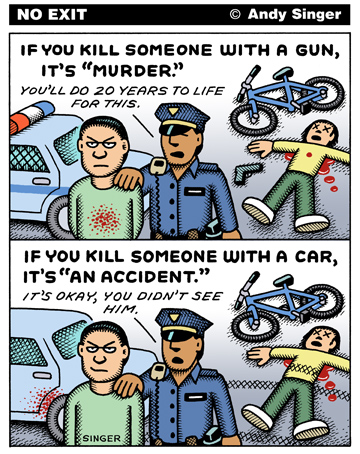
The U.S. continues to attract immigrants, but they don't come for the mounting infringements on rights and freedoms. People everywhere want peace, privacy and a modicum of prosperity. Despite the War on (of?) Terror and the trillions of dollars spent on it, life is not getting more comfortable except for the few profiting on the wars and the associate businesses (e.g., BP). Crowd control, whether abroad or at home, whether of the mind or on the street, via schools or prisons, is a growing priority for the top of the social pyramid. The New York Times headline of June 14, 2013 says it all: "Top News: Police Agencies Are Assembling Records of DNA." If one excuses this, such a person probably believes a gated "community" is his or her personal answer. Can everyone in the world live in a gated community?
Berlin or Beerlin takes it easy
What I have found upon returning to live in Europe, after many years' absence, is a more favorable contrast with my "Homeland." My more pleasant scene flies against the uptight vibe of the U.S. And I have experienced the latter over decades, and in several regions, where I've lived in the U.S. on both coasts. The quiet, relaxed atmosphere of Berlin, Germany produces an almost negligible amount of the stressful urban "buzz" detectable in U.S. cities. Is it the people? Are Berliners better mannered, better educated, and more relaxed than urban U.S. residents? It seems to be the case. But one simple factor is the lack of automobile dominance and plethora of large, unpaved parks.
There are many cars in northern Europe, but most seem to go nowhere except on occasional out-of-town trips. It is a matter of pride to commute by bicycle, and the facilities are ample. But the neighborhoods are also designed for walking no more than a block or two to buy essentials, sit in a park, catch a bus or subway, and -- of course -- enjoy a bar, restaurant or beer garden. With such environmental features, why wouldn't the vibe be more pleasant and calm than in the United Paved Precincts of America?
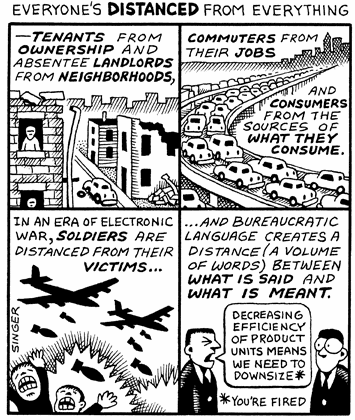
No doubt, the German police are ready to suppress riots. Demonstrations and protests are commonly expected, and tolerated. The police presence is not one of patrolling to spot moral wrong-doers, or to shoot enemies. One can walk down any Berlin street swigging a beer, and it's all fine. Now, Berlin is different from other towns in Germany. In other German towns, I've heard, a passing citizen would likely stare at someone swigging beer down the sidewalk.
So we might say U.S.Anians are deprived. It's a fact: significantly less vacation time is granted by the employers in "the Land of the Free and the Home of the Brave." Total working hours are more than in Europe, and there's no free health care for all the toil and devotion paid the owning class and its government. European nations are not squandering their workers' taxes on maintaining empires (anymore). The U.S. has taken on the policeman-of-the-world role, to protect corporate democracy, so one might say the Europeans benefit from this today. Indeed, they even participate in some military adventures such as Afghanistan. And the European societies are consumer oriented, whereby people buy most of what they (think they) need from unaccountable, distant strangers.
However, the average European's lifestyle is typically not about striving to buy more. This is true of almost every nation but the U.S. In northern Europe, maintaining a good life, with ample time for friends and family, prevails when possible. Yet I have heard of European families beset with trying to get ahead materially, with a resultant increase in personal debt and little disposable income, such that their poorer relations are often happier people. What in Europe is called "The Crisis" is the post-2008 recession that has made living a good life a challenge for a growing number. In severely hit Greece, young professionals are getting back to the land and reviving traditional skills to fill a niche in rural communities. In southern Europe especially, young people are depending more on their parents for housing. This is a reflection of unemployment, but it also testifies to stronger or more cohesive families than in the U.S. -- where, if one is over 21 it is to many shameful to share a home with one's parents.
As to European corporate media, behind the financial and political headlines is actually the permanent loss of cheap, ample petroleum and too many people for the land to support sustainably. These strains threaten the dreams of growth or "recovery" among the EU's political and business leaders. But these strains are not as strong or stressful as in the U.S., despite more open space in the U.S. In the U.S., driving around for some heavy shopping is such an essential freedom -- the only one remaining? -- that stores must be open late hours and on Sundays and most holidays. Not so in Europe.
There are approximately one billion hungry people in the world, without the lesser worries of U.S. or European residents (although there are hungry people there too). So a comparison just between the U.S. and Europe can seem narrow and non-compassionate. However, there are "Third World" nations rating happier than the U.S. Why is this so? Leisure time in most nations is not about being lazy, but about spending time with family. People need help in all families, and the roles of raising children and taking care of elders are seen as most honorable. And, measures of poverty can be unfair and ethnocentric: if a family does not have a dishwashing machine or other appliances, is that really being poor? Yes, according to neoliberal manipulators seeking to put populations in debt in order to privatize public services.
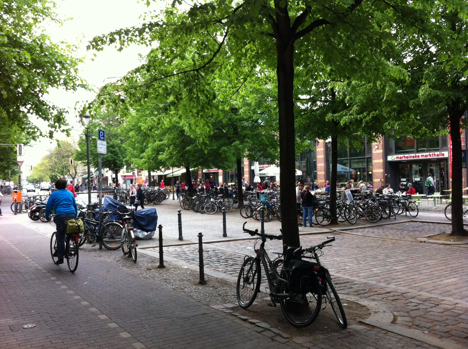
When the U.S. population can all take jet plane trips (or, lacking petroleum, sailing) to northern Europe to see pedestrian-friendly, bikeable cities, and a social safety net that works, the awakening will be massive! The more violent and uptight vibe of the U.S. may then start to dissipate. But, we know that the U.S. population will remain mostly isolated from other nations geographically and sociologically. So, what may help the denizens of the United Paved Precincts of America enjoy a more mellow existence? More foreign movies without gratuitous violence? A growing bicycling movement to compete with huge cars on oceans of asphalt? More meetings of Transition Town activists?
Those do help. But mainly it will take the disappearance of ample gasoline supplies for a prolonged period. Then people will change their habits and desperately get to know their neighbors. Pursuing divorces will be shelved. An example of how community sprouts up: I was speaking with radio host Mike Malloy about Americans' petroleum dependence and our isolated, consuming lifestyle. He brought up his witnessing the effects of one of the big hurricanes that hit Florida over a decade ago. The people on his street got together and helped each other. They became cooperative, dependable and effective. But when the crisis passed, he said "We reverted to the same non-involved relationships, so that the only left-over contact was in waving to each other as we drove by."
Things have to change, and they will. Whether it will be unimaginably wrenching, with food riots and paranoia involving guns, and emergency government action to herd the population, is unknown. Those with food cached and plentiful ammunition may do better, but ultimately it is community cooperation that will see people though a transition to local food self-sufficiency and maintaining clean water supplies. Dusting off that old bicycle, growing food instead of a lawn, composting, bartering instead of buying, trading skills, etc., will be all the rage. Getting started before the collapse can feel alienating, depending on where in the United Paved Precincts of America one resides -- or even in saner European cities -- but why not plan for the certain future? Why not turn our backs on the irresponsible corporate economy now, to the extent we can? You may find you are not alone. Join the fun. Stock up on guitar strings, heirloom seeds, and books that may take the place of individual online entertainment. Auf wiedersehen!
* * * * *
Further reading:
RISE OF THE WARRIOR COP: The Militarization of America's Police Forces by Radley Balko. PublicAffairs Books.
Police Agencies Are Assembling Records of DNA, New York Times
Police brutality caught on surveillance cameras
Grow up, America! - Sept. 11th analyzed in Jungian terms, on CultureChange.org, by Cal Simone
Anger-Fueled Suicides – A Society Without Dreams, on CultureChange.org, by Sharif Abdullah
17 cultural reasons why this European never wants to live in America, by Benny Lewis
Crime in the United States, Wikipedia
The Mike Malloy Show
Why the U.S. is F'ed up, and what to do about it, on CultureChange.org, by Jan Lundberg
Big Lie: America Doesn't Have #1 Richest Middle-Class in the World...We're Ranked 27th! "...there are 26 other countries with a median wealth higher than ours"
Andy Singer, cartoonist, can be contacted at andy@andysinger.com
Art of Eric Drooker
Edward Snowden on the questionable NSA spying: "So we can potentially reveal a potential terrorist with the potential to kill fewer Americans than our own Police?" Interview with Glenn Greenwald, June 17, 2013
........_o
......_\ \>,
....(_)/(_)
~~~~~~~~~~~~~

